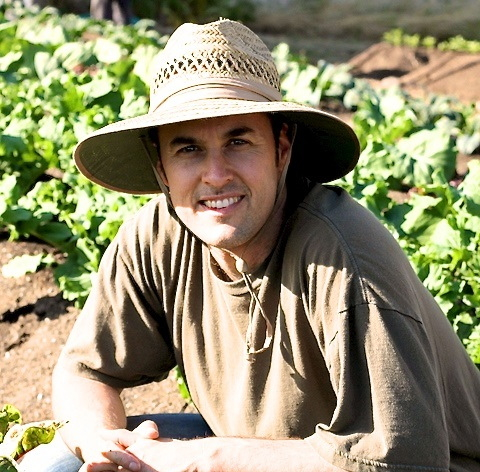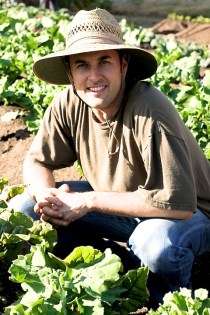
Adam Berman at his Berkeley farm.
Urban Adamah, a one-acre urban farm on a vacant lot in a gritty stretch of Berkeley, has transformed an area better known for liquor stores and light industry into a thriving community gathering space and food hub.
Adam Berman founded the farm in the summer of 2010 with just such lofty goals. Urban Adamah (for the Hebrew word for “earth”) offers a fellowship program for young adults, dubbed The Jewish Sustainability Corps, that integrates organic farming, social justice outreach, leadership training, environmental education, and progressive Jewish spiritual practice. There’s yoga, meditation, and singing too.
Berman, who directed a Jewish retreat center where he founded a similar fellowship in Connecticut before relocating to Berkeley, got a lucky break when landowner Wareham Development agreed to host the farm rent-free for two years. Hence, the portable feel to the project: The farm has dozens of raised, movable produce pallets, greenhouses, a cob oven, chicken coops on wheels, and large tents that serve as classrooms. Everything on the property could be transported with relative ease, if a new location proves necessary. Raised beds filled with fresh, organic soil also solves the problem of contaminated soil on the property, a former printing press site.
The resident fellows serve as hands-on farm educators for local school children and community members and intern with nearby social justice organizations dedicated to addressing poverty, food security, and environmental stewardship.
The program also seeks to fill a void by distributing healthy food in under-resourced neighborhoods. It provides classes on raising chickens and palate-bed building to budding urban farmers and holds lectures, workshops, film screenings, and farm celebrations that are attended by people of all ages and religious affiliations.
Q. Why Urban Adamah?
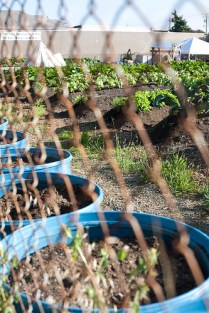
Photo by BeckCowles.
A. I think of Urban Adamah as Adamah 2.0. It has the immersive, progressive Jewish and environmental component that we developed in Connecticut [at the Isabella Freedman Jewish Retreat Center] but adds the social justice and community education piece. The farm in Connecticut is an hour from the closest city. Only a few hundred people visit each year. In our first year in Berkeley, a few thousand people came to our farm for community and environmental education events. In Connecticut all the food we grew we ate ourselves or sold at retail. Urban Adamah is about growing food for those in need. Ninety percent of what we grow we give away.
Q. Why Berkeley?
A. In many ways the Bay Area is the epicenter of the national food movement, and at the same time it’s a microcosm of the disparities of the rich and poor with regards to food access and food justice. You can buy $13 organic fair trade local chocolate bars in Berkeley but can’t find actual tomatoes in neighborhoods in West Oakland, where there isn’t one full-service grocery store. On a personal note, Berkeley feels like home to me.
Q. Can you give a rundown of what the farm has accomplished since it started?
A. Well, we constructed the fully portable farm from start to finish from February through August. We ran two fellowship programs with 24 fellows. We ran joyful programs in partnership with more than 20 local Jewish organizations. We provided four weeks of summer camp for 80 children and one-time educational programs for loads of local students. We celebrated each of the major Jewish holidays with community-wide farm events. And we produced more than 3,000 pounds of produce and distributed it through our free farm stand, food banks, and community groups. It was a busy year.
Q. How important is the spiritual component to the farm’s success?
A. It’s huge: The heart-mind-body trifecta informs everything we do. We believe that real change can’t happen in the world without being personally grounded and clear in each of these areas.
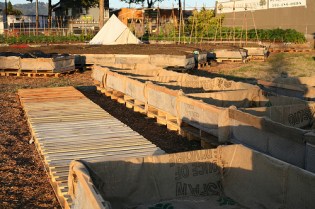
Raised beds are prepared to be filed with soil. (Photo by BeckCowles.)
Q. How would you describe the fellowship experience?
A. It’s my hope that this leadership training program offers these young adults the opportunity to become agents of change in their own lives and communities. The fellowships run for three months in the spring, summer, and fall. It’s based on an intensive service-learning model: Fellows live and work together full time and are immersed in a way of life informed by Jewish values and practices. They live in a rented home within biking distance of the farm. The home also serves as an indoor classroom. The fellows work with community-based organizations on direct service projects that address poverty, food security, and environmental stewardship.
Q. What’s key to the farm’s relationships with these food justice groups?
A. We look for three things in the local organizations — which include City Slicker Farms, Farm Fresh Choice, and Cooking Matters — that we partner with: We want mission alignment, solid supervision, and a place where fellows can have meaningful impact working one day a week. In general that means groups that can facilitate hands-on projects like building gardens or teaching cooking classes.
Q. Are there similar Jewish farm models in other parts of the country?
A. There’s Kayam in Baltimore, but it’s suburban and doesn’t offer a fellowship. And [the original] Adamah in Connecticut, as I’ve mentioned, which doesn’t have the social justice piece or much local community engagement.
Q. What are some of the challenges running this kind of non-profit?
A. Raising money for the farm is a challenge: 70 percent of my time is devoted to fundraising. And dealing with pests both large, like rodents, and small, like aphids.
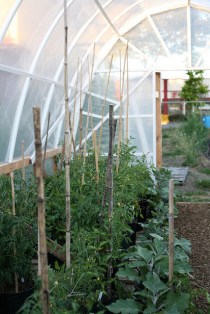
Urban Adamah hoop house. (Photo by BeckCowles.)
Q. What advice do you have for others who want to start something similar?
A. Start small. Secure the land. Prove the concept. Get the right staff on board.
Q. What do you love about your job?
A. It’s entirely in line with my personal values and vision for the world. I love the impact we have. I love the creative and entrepreneurial possibilities that this organization makes possible. I love that my daily life is a mix of program development, working with young adults, business development, meditation, and lots of singing.
Q. What’s next?
A. We’re moving into the worm business. Look for Urban Worm Composting to be live in early February.
And we want to expand the model. We’re looking at opening in Memphis next. And San Diego and Seattle are on our radar. We may also have to move our site in Berkeley at the end of 2012. We’ll know for sure in a month or two. I’d like us to be in four cities in the next five years.
